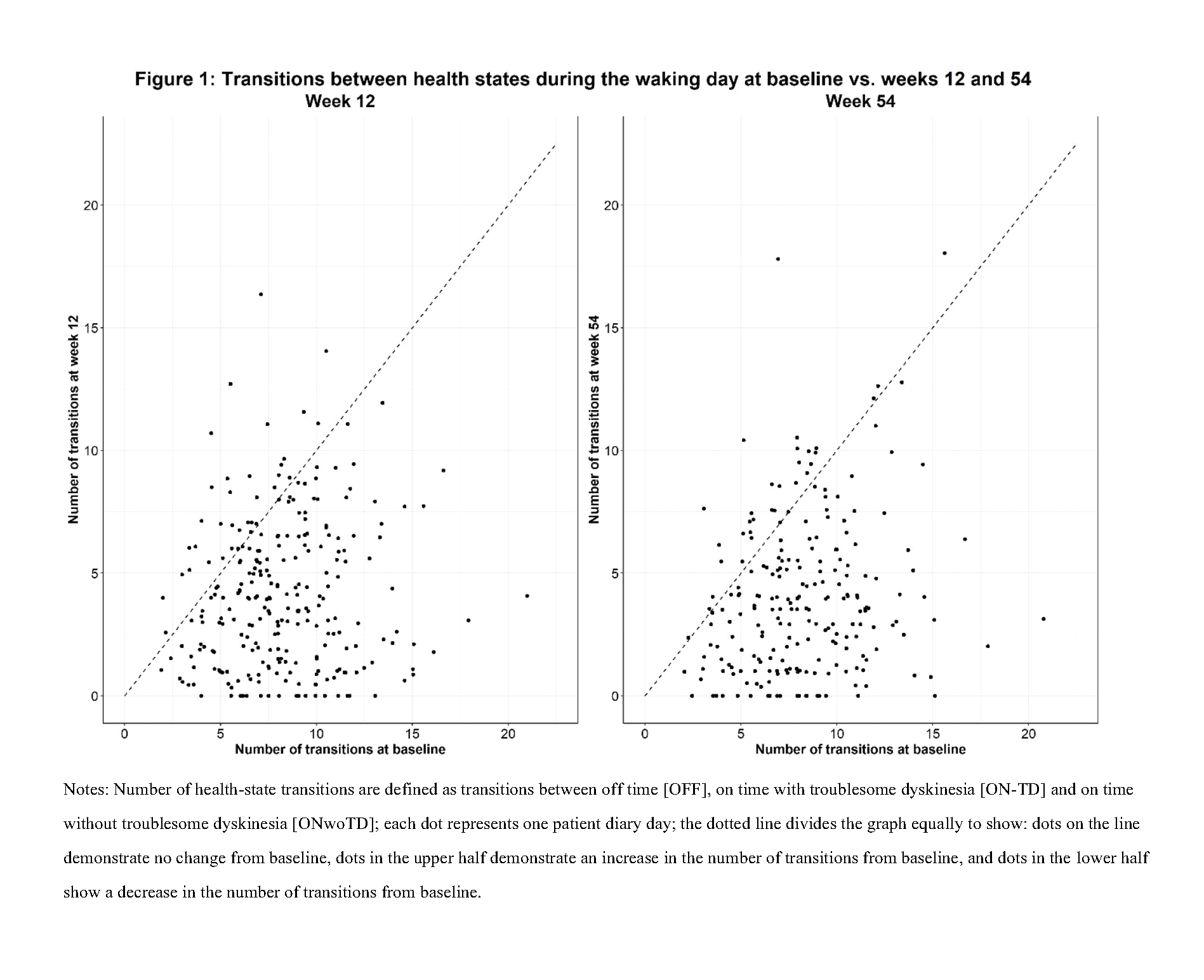Objective: To assess the long-term effectiveness of LCIG monotherapy on reducing daily health-state fluctuations and time to on without troublesome dyskinesia (ONwoTD) after waking
Background: LCIG demonstrated sustained reduction in total daily off time (OFF) by more than 4 hours in advanced Parkinson’s disease (APD) patients over 54 weeks [1]. LCIG has also demonstrated a reduction in time to ONwoTD after waking and an improvement in ONwoTD throughout the day [2]. However, the long-term effectiveness of LCIG monotherapy on health-state fluctuations and time to ONwoTD has not been studied.
Method: Post-hoc analyses of NCT00335153, a large, 54-week, open-label study of LCIG monotherapy patients were conducted. Patient diary data recorded patients’ motor states at 30-min intervals over 3 days at baseline and at weeks 4, 12, 24, 36, and 54. Generalized linear mixed models, adjusting for patient age, sex, country, and Clinical Global Impression of disease severity at baseline, were used to assess changes from baseline at each timepoint for 3 outcomes: 1. presence of extreme fluctuations (i.e., transitions between OFF and on time with troublesome dyskinesia [ON-TD]), reported as odds ratios [OR]), 2. number of health-state transitions (i.e., transitions between OFF, ON-TD, and ONwoTD, reported as incidence rate ratios (IRR), and 3. time to ONwoTD after waking, reported as hazard ratios.
Results: Patients demonstrated both short-term (4 weeks) and sustained (over 54 weeks) improvement in all 3 outcomes studied. Across all follow-up timepoints, patients experienced significantly fewer extreme fluctuations relative to baseline (OR ranged from 0.15 to 0.22, all P<0.0001). The number of health-state transitions experienced after treatment initiation was reduced by about half (IRR ranged from 0.46 to 0.53, all P<0.0001) across the follow-up timepoints relative to the average baseline level of 9.80 transitions [figure1]. At week 4, patients reached ONwoTD after waking 1.86 times faster than at baseline and about 2.23 to 2.51 times faster for all other follow-up timepoints relative to baseline (all P<0.0001).
Conclusion: This analysis found significant long-term effectiveness of LCIG monotherapy in reducing health-state fluctuations and the time to ONwoTD, which may improve predictability in a patient’s day.
References: 1. Fernandez, H. H., Standaert, D. G., Hauser, R. A., Lang, A. E., Fung, V. S., Klostermann, F., … & Espay, A. J. (2015). Levodopa‐carbidopa intestinal gel in advanced Parkinson’s disease: final 12‐month, open‐label results. Movement Disorders, 30(4), 500-509. 2. Pahwa, R., Aldred, J., Gupta, N., Terasawa, E., Horton, G., Macaulay, D., … & Isaacson, S. (2020). Rapid on-time onset and sustained improvements in motor states throughout the day following treatment with levodopa/carbidopa intestinal gel (LCIG) vs immediate-release levodopa/carbidopa oral capsules (LCIR): 930. Movement Disorders, 35.
To cite this abstract in AMA style:
R. Pahwa, J. Aldred, A. Merola, N. Gupta, E. Terasawa, V. Garcia-Horton, P. Kandukuri, Y. Jalundhwala, Y. Bao, O. Ladhani, S. Isaacson. Levodopa/carbidopa intestinal gel (LCIG) reduces fluctuations and shortens time to on without troublesome dyskinesia in advanced Parkinson’s Disease: Post-hoc analyses of 54-week LCIG-monotherapy trial [abstract]. Mov Disord. 2021; 36 (suppl 1). https://www.mdsabstracts.org/abstract/levodopa-carbidopa-intestinal-gel-lcig-reduces-fluctuations-and-shortens-time-to-on-without-troublesome-dyskinesia-in-advanced-parkinsons-disease-post-hoc-analyses-of-54-week-lcig-monother/. Accessed December 19, 2025.« Back to MDS Virtual Congress 2021
MDS Abstracts - https://www.mdsabstracts.org/abstract/levodopa-carbidopa-intestinal-gel-lcig-reduces-fluctuations-and-shortens-time-to-on-without-troublesome-dyskinesia-in-advanced-parkinsons-disease-post-hoc-analyses-of-54-week-lcig-monother/

